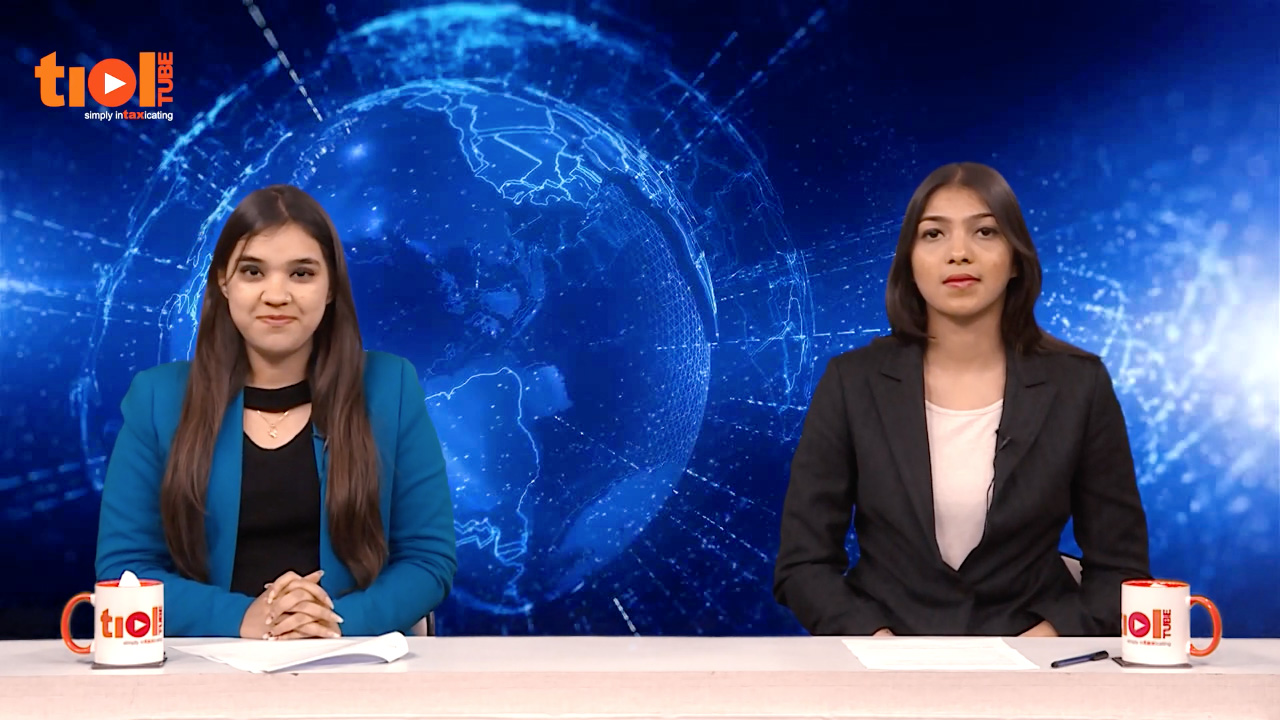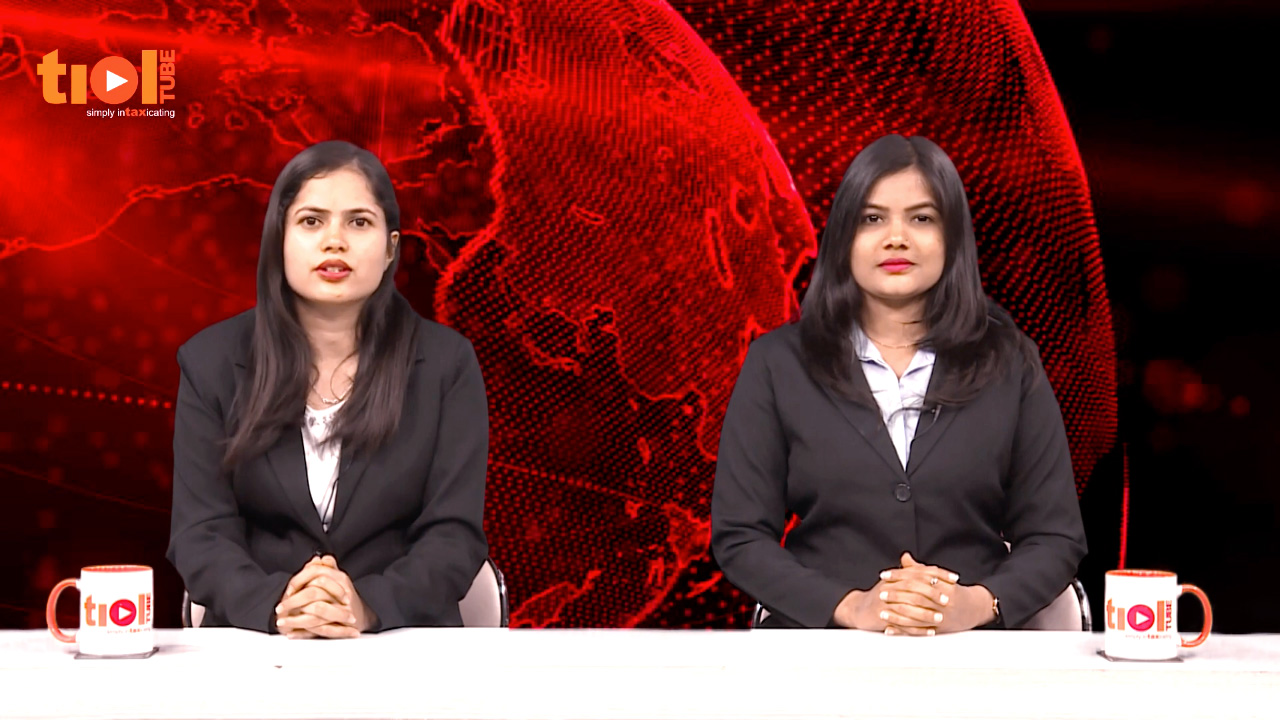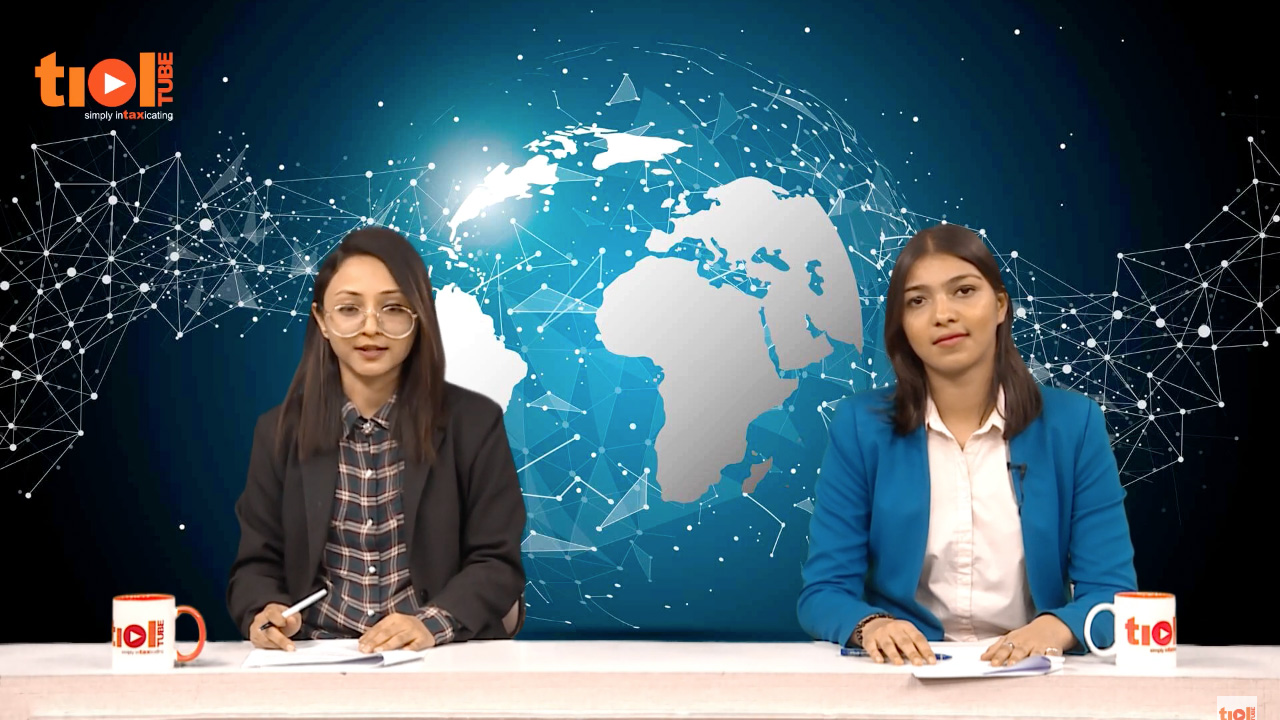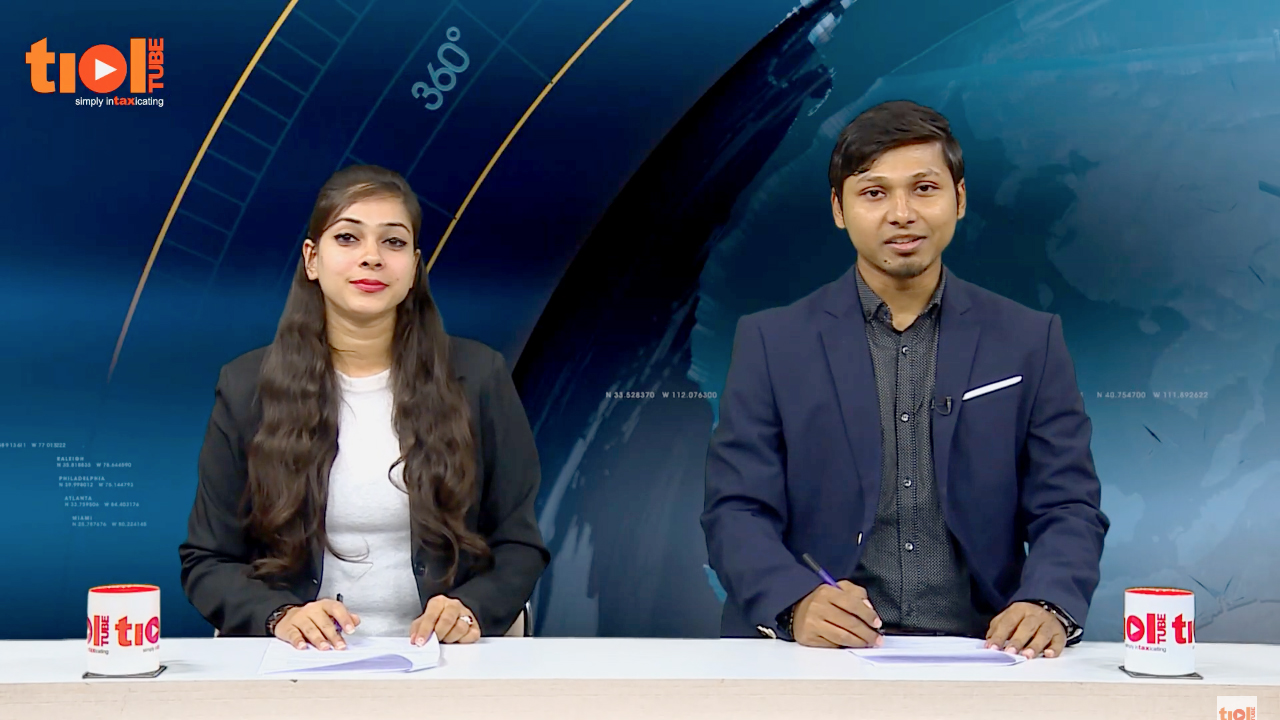 |
 |
2020-TIOL-NEWS-003 | Friday January 03, 2020 |
 |
 |
Dear Member,
Sending following links. Warm Regards,
TIOL Content Team
TIOL PRIVATE LIMITED.
For assistance please call us at + 91 850 600 0282 or email us at helpdesk@tiol.in. |
 |
|
 |
 |
 |
TIOL TUBE VIDEO |
 |
|
 |
DIRECT TAX |
 |
|
 |
 |
 |
 |
 |
 |
 |
|
2020-TIOL-21-ITAT-MUM DCIT Vs Johnson And Johnson Ltd
Whether appeal merits dismissal where tax effect involved is less than the monetary limit notified in CBDT Circular No 17/2019 - YES: ITAT
Whether it is fit case for imposing penalty where the issue of taxability of the foreign branch is of debatable nature - NO: ITAT
- Assessee's appeal allowed: MUMBAI ITAT
2020-TIOL-26-ITAT-DEL
ITO Vs APJ Construction Pvt Ltd
Whether meticulous paperwork put forth by the assessee is per se sufficient to discharge onus of Section 68, considering the preponderance of assessees to cover up illicit accomodation entries so as to make them appear genuine & legal - NO: ITAT
Whether therefore it is also the obligation of the authorities to verify the genuineness of such documents - YES: ITAT
Whether an order of the CIT(A) merits being quashed where it sets aside additions framed u/s 68, by considering certain documents produced by the assessee, but without ascertaining the identity & creditworthiness of the share applicants or genuineness of the transaction - YES: ITAT
- Revenue's appeal allowed: DELHI ITAT
2020-TIOL-20-ITAT-KOL
Rukmani Agencies Vs ITO
Whether in the absence to show cause notice for genuineness of the opening stock or purchase, ipso facto treat a transaction as bogus – NO: ITAT
Whether disallowance of pro rata interest on amounts advanced to sister concern is sustainable where such amount is loaned on account of commercial expediency - NO: ITAT
- Assessee's Appeal partly allowed: KOLKATA ITAT
2020-TIOL-19-ITAT-MAD
Muthukumaran Rangarajan Vs ITO
Whether levy of penalty u/s 271(1)(c) is sustainable when the assessee fails to furnish evidence supporting its rebuttal of the factual position - YES:ITAT
Whether the assessee's contention that the AO did not strike off the relevant limb of Section 271(1)(c) is sufficient to contest imposition of penalty, where the assessee very well understands the terms of the SCN, having filed an explanation in response - NO: ITAT
- Assessee's Appeals dismissed: CHENNAI ITAT
2020-TIOL-18-ITAT-MAD
P Thangavel Vs ITO
Whether when interest is redeployed to earn further interest, the assessee can claim its own rate of interest contrary to the actual income received - NO: ITAT
Whether difference between the rate of interest on actual income and interest received qualifies as unexplained investment - YES: ITAT
Whether in the absence of book of accounts for agricultural operations it is not justiciable to allow 100% of the exemption- YES: ITAT
- Assessee's Appeal partly allowed: CHENNAI ITAT
2020-TIOL-17-ITAT-MAD
Pramila Patel Vs ITO
Whether when the assessee fails to explain the nature of transaction before the CIT(A), there is any ground for the Tribunal to interfere in the case - NO: ITAT
- Assessee's Appeals dismissed: CHENNAI ITAT
2020-TIOL-16-ITAT-INDORE
Ramesh Medical Stores Vs ACIT
Whether expenses incurred on payment of commission is to be disallowed solely on the basis of statements that excessive amounts of commission had been paid, where no adverse evidence suggests that such commission was not paid or was received back - NO: ITAT
- Assessee's Appeals allowed: INDORE ITAT
|
|
|
 |
   |
 |
|
 |
 |
GST CASE |
 |
|
 |
 |
 |
 |
 |
 |
 |
|
2020-TIOL-03-AAAR-GST
East Hooghly Agro Plantation Pvt Ltd
GST - Appellant is a manufacturer of tarpaulins made from High Density Polyethylene (HDPE) woven fabrics - appellant had sought advance ruling as to whether HDPE woven tarpaulins are classified as "Textiles and Textile articles" under Section XI of the First Schedule of the Customs Tariff Act and whether HDPE woven tarpaulin is classified under either of HSN 6306/6301/5903 of GST Tariff - AAR had held that HDPE Woven fabric coated with LDPE melt is not a textile fabric and tarpaulins made from the said laminated fabrics is not classifiable under either of HSN 6306/6301/5903 of GST Tariff - aggrieved, the appellant is before the AAAR.
Held: On examination of the samples produced by the appellant, it is clear that as the principal characteristic of tarpaulin is water proofing and unless the HDPE woven fabric is laminated it cannot be used to make tarpaulin; that the process of lamination cannot be ignored or treated in isolation and it is an integral and vital process in the manufacture of tarpaulin from HDPE fabric - therefore, in view of Note 1(h) of Section XI of the Tariff Act, tarpaulins of HDPE woven fabric, laminated as per specification of IS 7903:2017, being expressly excluded, do not merit classification under Chapter 63 - so also, in view of Chapter note 2 to Chapter 59, HDPE woven fabric is not a textile material and does not merit classification under HSN 5903 - no infirmity in the ruling pronounced by AAR, hence same is upheld - appeal is dismissed: AAAR
- Appeal dismissed : AAAR
2020-TIOL-02-AAAR-GST
TP Roy Chowdhury And Company Pvt Ltd
GST - Appellant supplies the services of loading, unloading etc. after the cargo of yellow peas imported from a foreign land reaches the port of entry - produce has been procured from the farmers in foreign land and exported to India - CBIC Circular 16/16/2017-GST clarifies that the process of de-husking or selling of pulses is usually not carried out by farmers or at the farm level but by the pulse millers and, therefore, such products are not to be considered as 'agricultural produce ' ; that as soon as the goods leave the farmer's hand and the primary market, the services rendered thereafter are not to be considered related to cultivation of plants and classifiable under SAC 9986; that, therefore, exemption under Sl. No. 54(e) of 12/2017-CTR is not available - Appeal to the AAAR.
Held: There is no dispute that raw whole yellow peas are agricultural produce covered under Sl. no. 45 of the Rate Notification and are exempted goods, however, this particular consignment of raw whole yellow peas was harvested in a foreign land and the primary market concerned or the farmers' market is located in that foreign land - From a combined reading of entry no. 54(e) of 12/2017-CTR and definition 2(d) of the exemption notification, all services and processes are excluded beyond the primary market - term ‘primary market' in common parlance refers to farmers' market like ‘Mandi' or ‘arhat' being a place where the farmers directly sell their product to the buyers like wholesalers, millers, food processing units etc. - spirit of the legislature is intended to boost the agricultural sector of the home country and not that of the foreign land - primary market in the instant case being located in foreign shores does not conform to the definition stated in 2(d) of the notification - further, there is no evidence that the grains have not undergone any type of treatment before leaving the foreign country from where they have been imported into India - no infirmity found in the order of the AAR - appeal is dismissed: WB AAAR
- Appeal dismissed: AAAR
2020-TIOL-01-AAAR-GST
Macro Media Digital Imaging Pvt Ltd
GST - Appellant is engaged in the business of printing of trade advertisement material (heading 4911) using printing ink and base material and the content of which is provided by the recipient - appellant sought to know from the Advance Ruling Authority the classification of the Trade advertisement material - AAR held that the s upply is a composite supply, where the service of printing is the principal supply, therefore, since the goods supplied having no use other than displaying the printed matter, same is ancillary to the principal supply of printing; that the service of printing is classifiable under SAC 9989 and taxable under Sl. No. 27(i) of 11/2017-CTR - Appellant is in appeal against this order before the AAAR.
Held: Both the appellant and AAR have taken recourse to the Circular 11/11/2017-GST dated 20.10.2017 on the subject ‘Clarification on taxability of printing contracts' - whereas appellant relies on paragraph 5 of the said Circular, the AAR has relied upon paragraph 4 of the same - On careful reading of the said paragraphs it is seen that the only difference between the two is that under para 4, the usage right is owned by the supplier of the content whereas in the case described in para 5, no such usage right is owned by the supplier of the design/logo - it can also be concluded that items mentioned in para 4 have no secondary use other than carrying the printed content whereas the articles mentioned in para 5 have secondary usage - inasmuch as although wallpaper displays designs printed or embossed on its body, it has another usage and that is of protecting the wall - in the instant case, the PVC sheet does not have any other usage other than displaying the advertisement content - moreover, in the present case, the advertisement materials carry specific messages meant for customers and the contents are very specific to the product for which the advertisements are made - for example, advertisement meant for Hyundai cannot be used by Hero or any other company, therefore, the content is exclusively the property of the client who entrusts the job to the appellant and the usage right of the content remains with the client of the appellant, but this is not the case as described in paragraph 5 of the Circular which the appellants seeks to rely upon - Authority is, therefore, of the considered opinion that the supply is a composite supply, supply of service being predominant and the case of the appellant is more akin to the case described in paragraph 4 of the Circular 11/11/2017-GST - it is clear beyond doubt that what the appellant supplies is nothing but ‘ ervice' and their argument that they supply ‘ oods' has no basis - no infirmity in the ruling pronounced by AAR - appeal dismissed: AAAR
- Appeal dismissed: AAAR
|
|
|
 |
   |
 |
|
 |
 |
INDIRECT TAX |
 |
|
 |
 |
 |
 |
 |
 |
 |
|
SERVICE TAX 2020-TIOL-18-CESTAT-HYD
Andhra Pradesh Heavy Machinery And Engineering Ltd Vs CC, CE & ST
ST - The assessee-company manufactures Haulers, Belt Conveyors, Road Headers and spares thereof - It filed ST-3 returns in the relevant period under GTA service - SCN was issued on grounds that the assessee did not file any return under BAS, because as per the Revenue, the procurement of goods or services which were inputs to the clients were taxable w.e.f. 10.09.2004 under BAS - It was also alleged that the assessee procured bearing plates from one company and supplied the same to M/s Singareni Collieries Ltd under contract - In the SCN, it was also assumed that the assessee issued an in-transit sale invoice based on Form C issued by the consignee and did not pay sales tax but had claimed exemption - Hence the Revenue opined that the assessee had facilitated procurement of goods for consideration and that the assessee added its consideration to the basic procurement value of the goods on which service tax was payable on the amounts earned in respect of the transactions in question - It was also alleged that the assessee got the benefit of the price difference between the purchase price and the amount collected by it which was hit by Section 67 of the Finance Act as per which the taxable value would be the gross amount charged by the service provider; and that since the financial benefit was obtained by the appellant for arranging the supply, Service Tax was payable on the differential price or the price margin earned - On adjudication, the demands were confirmed with interest and penalties being imposed - Hence the present appeal.
Held - The issue at hand stands resolved by the Tribunal's decision in M/s. AIA Engineering Ltd. Vs. The Commissioner of S.T., Ahmedabad wherein activities similar to those performed by the assessee herein, were held to not fall under BAS - It is also settled law that applicability of sales tax and service tax are mutually exclusive, as follows from the Apex Court's decision in Imagic Creative Pvt. Ltd. Vs. Commr. of Commercial Taxes - Merely because exemption is availed under Sales tax Act, the transaction does not cease to be a sales transaction - The State Sales Tax authorities considered the sale transactions in question and also passed assessment orders which are placed on record - Apart from this, there is no evidence to suggest tha tthe assessee did not undertake any sale transaction or rather, provided only services as alleged - The declaration in Form E-1 issued by the supplier directly to the beneficiary is placed on record, as it the Form C issued by the customer - Hence the demands raised are unsustainable: CESTAT
- Assessee's appeal allowed: HYDERABAD CESTAT
CENTRAL EXCISE
2020-TIOL-20-HC-MAD-CX
Mobis India Ltd Vs CCE & GST
CX - The Assessee is engaged in business of manufacture of Automotive parts which were repacked and relabelled and this activity admittedly falls within the definition of "manufacture" as defined under Section 2(f)(iii) read with Section 4(A) of CEA, 1944, which pertains to valuation of excisable goods with reference to retail sale price - The question of excisability of duty is not in doubt - The only question that is sought to be raised is as to what should be the valuation of goods which should be adopted - The assessee on merits of the case may contend that the requirement of affixing MRP would arise only when the actual sales takes place - But that question necessarily depends upon the valuation adopted by assessee for said purpose: whether valuation would be adopted as per CAS-4 Costing Method, which is cost of manufacturing + 10%, or valuation as per Section 4A, which is MRP affixed as per the requirement of Legal Meterology Act - Therefore, this contention of assessee on the merits of the case is a ground of appeal which can be raised before the Supreme Court - The objection raised by Revenue is valid and well founded and the appeal is maintainable only before the Supreme Court as per the relevant provisions of the Act: HC
- CMA dismissed: MADRAS HIGH COURT
2020-TIOL-20-CESTAT-MUM
CCE Vs Amiantit Fiberglass Industries India Pvt Ltd
CX - It is quite evident that for the supplies made against the purchase order dated 18.03.2004, Respondents have over and above the contracted sale price received consideration of Rs.5,92,34,987/- - In view of the Rule 6, any amounts that have been received over and above the sale price of excisable goods in any form or manner, is an additional consideration and is required to be added to the transaction value for determination of assessable value - Issue involved has been settled by the Apex Court in case of Indorama Synthetics (I) Ltd] - 2015-TIOL-190-SC-CX - Though Commissioner has in impugned order upheld the demand to the extent of price difference between the goods supplied by availing the benefit of EPCG License and those supplied without availing the same, the reason for limiting to the price differential is not explicit when investigations show that respondents have additional consideration much higher than the price differential - By the Finance Act, 2000, the concept of transaction value has been introduced in section 4 of the CEA, 1944 - Every transaction has to be examined separately and uniquely, and the assessable value determined accordingly - In the case were additional consideration has been received against a particular supply, then the exact quantum of additional consideration received is to be added to the transaction value of that supply - since the respondents have not paid the amount of duty required to be paid with interest, benefit of Section 11A(2B) of CEA, 1944 could not have been extended to the respondents - issue in respect of penal proceedings in terms of Section 11AC read with Rule 26 of Central Excise Rules, 2002 needs to be considered afresh - appeal filed by the revenue is allowed and matter is remanded back to adjudicating authority for fresh adjudication – as the matter is quite old, re-adjudication needs to be completed within four months: CESTAT [para 4.3, 4.5, 4.7, 5.1]
- Matter remanded: MUMBAI CESTAT
2020-TIOL-19-CESTAT-BANG
Ashok Iron Works Pvt Ltd Vs CCT & CE
CX - CENVAT - Input Service - Rule 2(l) of CCR, 2004 - Apex Court in the case of Ultratech - 2018-TIOL-42-SC-CX has held that after the amendment in the definition of 'up to the place of removal' in the year 2008, the place of removal will always be factory gate and the assessee is not entitled to cenvat credit on GTA up to the buyer's premises - after the decision of the Apex Court in the case of Ultratech, the CBEC has issued Circular 1065/4/2018-CX dated 08/06/2018 wherein the field formations have been given the liberty to examine each and every case on the basis of the law laid down in various cases - Bench is of the considered view that in view of the decision of the Madras High Court in the case of Bata India Limited - 2019-TIOL-1861-HC-MAD-CX and also in view of the Board Circular, the matter needs to be remanded to the original authority to verify certain factual aspects such as whether the sale is on FOR basis, whether the freight is integral part of the sale price, whether the duty paid on the value inclusive of freight amount etc. - Matter remanded: CESTAT [para 5, 6]
- Matter remanded: BANGALORE CESTAT
CUSTOMS
2020-TIOL-19-HC-DEL-CUS
DRI Vs Mohammed Nashruddin
Cus - The respondent, a holder of an Indian passport, is facing trial for commission of offences under Section 135 of Customs Act, 1962 - The respondent was enlarged on bail and the application for cancellation of bail, moved by DRI, was also rejected by CMM - It appears that DRI has accepted the said order and has not carried the matter to any higher forum - One of the conditions, on which bail was granted to respondent, was that he would not leave the country without seeking permission of the trial court - In view of said condition, the respondent moved an application, before trial court, for permission to travel abroad - The ground, adduced by respondent, was that he had two minor children, who were studying in the United Arab Emirates (UAE) and that, owing to his being detained in India, the studies of the children were being seriously affected - It was also sought to be contended that the respondent's business interests were also being jeopardized, as a result of his continued stay in India - The respondent is permitted to travel abroad for a period of two months, which will commence from the date when he departs - For this purpose, DRI is directed to return the passport of respondent to him within a period of one week - The passport appears to have been retained by DRI despite the order of CMM and ASJ even without obtaining any stay from this Court - The respondent shall ensure that he will appear before the Indian Embassy at Dubai every 10 days - No default, by the respondent, in this regard, shall be condoned and any default, in this regard, will result in this order standing vacated and ceasing to apply - The respondent shall return to India on or before the date of expiry of two months from the date of his departure, and shall inform the DRI accordingly: HC
- Petition disposed of: DELHI HIGH COURT
2020-TIOL-17-CESTAT-KOL
CC Vs Amit International
Cus - Import of old and used worn clothing - At the time of original assessment, the declared value of the imported goods was enhanced from the CIF price of US$ 1.00 per kg. to US $ 1.316 per kg - original authority ordered confiscation of the goods and also imposed a redemption fine of @25% to 27% of the value along with personal penalty varying from 15% to 15.2% - Commissioner(A) has reduced the redemption fine and penalty imposed to 10% and 5% respectively - Aggrieved, Revenue is before the CESTAT.
Held: Commissioner(Appeals) has ordered reduction of redemption fine and personal penalty on the basis of ratio laid down by the Tribunal in the case of Omex International - 2015-TIOL-582-CESTAT-DEL - Tribunal has in the said case taken a view that redemption fine of 10% and penalty of 5% of the value of the imported goods would be appropriate in case of imports made by violating Exim Policy Provisions - impugned order is, therefore, upheld and the appeal filed by the Revenue is rejected: CESTAT [para 8, 9]
- Appeal rejected: KOLKATA CESTAT
| |
|
 |
   |
 |
|
 |
 |
HIGH LIGHTS (SISTER PORTAL) |
 |
|
|
|
|
 |
|
 |
 |
TIOL PRIVATE LIMITED.
TIOL HOUSE, 490, Udyog Vihar, Phase - V,
Gurgaon, Haryana - 122001, INDIA
Board :
+91 124-6427300
Fax: + 91 124-6427310
Web: https://taxindiaonline.com
Email: updates@tiol.in
__________________________________
CONFIDENTIALITY/PROPRIETARY NOTE.
The Document accompanying this electronic transmission contains information from TIOL PRIVATE LIMITED., which is confidential, proprietary or copyrighted and is intended solely for the use of the individual or entity named on this transmission. If you are not the intended recipient, you are notified that disclosing, copying, distributing or taking any action in reliance on the contents of this information is strictly prohibited. This prohibition includes, without limitation, displaying this transmission or any portion thereof, on any public bulletin board. If you are not the intended recipient of this document, please return this document to TIOL PRIVATE LIMITED. immediately |
 |
|
 |








